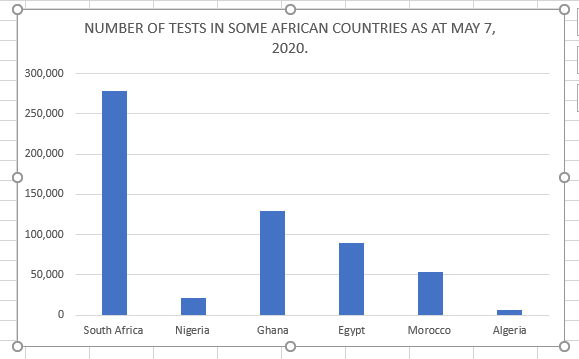Covid-19: Cases on the rise, but testing falls below expectations

By Ifah Ele Sunday
President Muhammadu Buhari, on April 27, 2020 ordered the ease of lockdown in three major high-infection states in the country. The three states, Lagos, FCT, and Ogun, had been on lockdown since March 30. This decision was as a result of the impact the lockdown had on the economy.
In his speech, he said, “Our goal was to develop implementable policies that will ensure our economy continues to function with while still maintaining our aggressive response to the COVID nineteen pandemic. These same difficult decisions are being faced by leaders around the world”.
President Buhari, in his address gave the following instructions for easing the lockdown and to curb the spread of Covid19:
1. Ban on large gatherings
2. Physical distancing by maintaining a distance of 2 metres between yourself and others
3. Regular handwashing with soap under running water
4. Frequent cleaning of surfaces with soap and water or disinfectants
5. Ban on non-essential inter-state passenger travels until further notice
6. An overnight curfew from 8pm to 6am. This means all movements are will be prohibited during this period except essential services
7. Restrictions on social and religious gathering shall remain in place
8. Retention of the ban on all passenger flights.
9. Mandatory temperature checks in public spaces.
10. Controlled access to markets and locations of economic activities
Some Western countries, like Spain and Italy, had also eased the lockdown in their respective countries. In Spain, where 221,000 confirmed cases with over 26,000 deaths, businesses also re-opened on Monday, May 4. Unlike the West, the infection rate in Nigeria has been on the increase.
Italy, which has over 214,000 confirmed cases with over 29,000 deaths also eased the 40-day lockdown in the country. Last week, Italy’s prime minister, Giuseppe Conte, outlined plans to slowly ease the country’s quarantine. Italians will now be able to travel within regions to visit relatives, provided they wear masks, but schools, hairdressers, gyms and many other commercial activities will stay closed; cafes and restaurants will offer takeaways only; and all travel between regions will be banned except for work, health or emergency situations. Restrictions on funerals have been relaxed, with a maximum of 15 mourners allowed to attend, but masses and weddings will have to wait.
On the eve of Italy’s first steps toward easing restrictions, the Health Ministry reported 174 deaths in the 24-hour period ending Sunday evening — the lowest day-to-day number since the national lockdown began on March 10. Parks and public gardens reopened on Monday.
Greece, which was under lockdown for 42 days also eased the lockdown in the country as people on Monday were free to leave their homes without an authorized reason, and hair salons, book stores, clothes shops and other small retailers reopened.
Sweden which had over 23,000 cases and 2,914 deaths observed no lockdown. Senior high schools have been closed and gatherings of more than 50 people have banned. Rather than ordering people to avoid non-essential travel, people work from home and stay indoors if they are over 70 or feeling ill. Shops, restaurants and junior schools have stayed opened.
Nigeria’s Minister of Health, Dr. Osagie Ehanire said that “the high number of new cases is a manifestation of improved testing but also of ongoing community transmission,” Ehanire said.

Minister of Health, Dr Osagie Ehanire
“The NCDC laboratories have the capacity to test 1,500 samples per day in 13 laboratories per day. We are testing an average of 600 samples per day because that is all the samples collected and sent for testing.”
He said the underutilization can be due to surveillance, sample collection and mode of transportation which could be improved through investments in logistics.
The tests are based on set criteria such as travel history, contacts or symptoms or clusters for the best prospects of high yield, where then they place those with positive test in treatment and isolation; trace all their contacts and quarantine them for 14 days.
In a press briefing held on May 6, he said, “the continued rise in the number of COVID-19 positives is not unexpected due to prevailing circumstances in certain states; and also, for the fact that we are clearly in community transmission phase.”
The Health Minister insisted that “We are to adhere to public health advisories – wearing our face masks, observing social distancing, practicing hand washing or sanitizing, standard respiratory hygiene, avoiding crowded places and all manner of non-essential travel, as well as reporting when we feel unwell, or someone close to us has symptoms of Infection.”
According to the NCDC’s data from May 1 to May 7, Lagos had 530 confirmed cases, Kano with 251, FCT with 106, Kaduna and Gombe with 60 and 29 respectively. Bauchi had 64 cases so far in the month of May, Sokoto with 57, Borno and Katsina with 63 and 68 respectively, Rivers had 9, Edo with 25, Ogun with 45, Adamawa and Jigawa with 11 and 76 respectively.

Coronavirus infections in some states from May 1 to May 7 2020
Nigeria has a very low testing capacity and therefore we have had low tests compared with other African countries.
Nigeria, with a population of about 200 million people has only tested 21,000 so far. South Africa has a population of about 58 million and has tested over 279,000 people. Ghana, with about 30 million citizens has tested 129,000, Egypt has a population of about 98 million citizens and has tested 90,000. Morocco, with a population of 36 million people has tested over 53,000 people while Algeria has a population of 42 million but has only tested 6,500 people so far.

Coronavirus testing in some African countries
What people are saying about this
Federal Ministry of Health said that NCDC has adopted the smart testing strategy by going to areas of high yield where there are clusters of positive cases to conduct house to house search to identify those who have symptoms
“The rate of testing is low compared to other countries because the @NCDCgov has adopted the smart testing strategy by going to areas of high yield where there are clusters of positive cases to conduct house to house search to identify those who have symptoms” @DrEOEhanire
— Federal Ministry of Health, NIGERIA (@Fmohnigeria) April 30, 2020
Some citizens worry that the ease of the lockdown may worsen the spread of the virus as it leaves more Nigerians even more vulnerable and susceptible.
UK = 120,000 tests per 8hours.
Nigeria = 10,000 tests in one month.The question no one is asking is — Has the govt done enough to guarantee that a ease of lockdown won’t worsen the situation?
Poor palliative distribution & low testing are pointers to Failure really #LoluRants
— Ọ̀gágun Akinlolú ❁ (@LoluAkinteye) May 1, 2020
According to some, Ghana is testing more people in a week than Nigeria has tested in 10 weeks. Many consider this meagre compared to other African countries like Ghana and South Africa which have both conducted over 129,000 and 279,000 tests respectively. For a country with the highest population in Africa, Nigeria’s testing capacity is very low.
Between 1May-4May Ghana @DSD_GHS carried out 18,853 Covid19 tests. 922 were found to be positive (In total 135,902 tested with 3,091 positivel). 27Feb-6May Nigeria @NCDCgov tested a total of 22,492 with 3,145 positive. How is Ghana testing more in a week than Nigeria in 10 weeks?
— JasonNjoku (@JasonNjoku) May 7, 2020
Others have said that the cases in Kano have been on the increase since April
In March, there was no COVID-19 case in Kano, but since April 11 when it recorded its index case, there has been a surge in the number of persons infected with the virus.
Currently, the state with 365 cases is second only to Lagos State with 1,183 cases.
— Adetutu Balogun (@Tutsy22) May 6, 2020
Some have expressed concerns over the figures in Kano, doubting if NCDC is being honest with the data it presents to Nigerians.
Kano contributed 50 cases to Kaduna but it has 2 cases today itself? It’s either Kano doesn’t rate NCDC or NCDC doesn’t rate Nigerians.
— JJ. Omojuwa (@Omojuwa) May 2, 2020
Despite the high population of Nigeria, there have been valid concerns as to the number of tests the NCDC has conducted so far. According to its official site, it has carried out over 21,000 tests. This twitter user said that once NCDC ramps up its testing capacity, the confirmed cases would increase.
…the reason why Nigeria’s figures are still very low, is because we’ve not been able to increase our capacity to test more..till the day we’re able to…it will be explosive
— sT.piO (@sumilai001) April 14, 2020
The Insight Report
Nigeria Coverage



